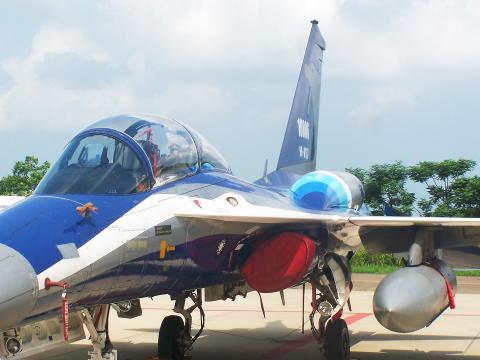State-owned Aerospace Industrial Development Corp (AIDC, 漢翔航空) is facing promising prospects for the coming years, with an advanced trainer program in the works and the likelihood of a major role in a possible F-16A/B upgrade project.
One of the main projects AIDC is working on is a new advanced and completely indigenous trainer, Mike Lee (李適彰), secretary-general of the National Defense Industrial Association of Sino (中華國防工業發展協會), told the Taipei Times on the sidelines of the Taipei Aerospace and Defense Technology Exhibition yesterday.
The firm has been working on a XAT-5 prototype, a twin-engine trainer that, according to some industry analysts, could be based on the Indigenous Defense Fighter’s (IDF) airframe.

Photo: J. Michael Cole, Taipei Times
Although he would not provide a time frame and said the air force had yet to green-light a specific model, Lee, who also serves as a special assistant to AIDC chairman Jason Liu (劉介岑), said the next few years would be the perfect time to introduce a new trainer to replace the twin-engine AT-3 — also manufactured by AIDC — that entered service in 1984.
Turning to the mid-life upgrade of Taiwan’s 130 F-CK-1A/B “Ching Kuo” IDFs, Lee said work on the first 71 aircraft was continuing and provided the air force had the budget, a second-phase upgrade, which would complete the remainder of the fleet, could be launched at some point. The first phase of the program has delivered six upgraded aircraft so far.
The configurations involved in the second-phase upgrades are still under discussion between AIDC and the air force, Lee said.
AIDC is also likely to play a role on the Lockheed Martin F-16s.
Not only could the firm be assigned some subcontracting work on the 66 new F-16C/Ds Taiwan has been requesting from the US since 2007, but the previous day a senior official at Lockheed told the Taipei Times that most of the work on the US$4.5 billion program to upgrade Taiwan’s 144 F-16A/Bs would be carried out in Taiwan.
Given the great similarities between the IDF and the F-16, and AIDC’s experience handling both, it is very likely that AIDC would get the contract for the F-16A/B upgrade, though ultimately the decision lies with the air force, Lee said.
The US is expected to announce its final decision on the F-16C/D sale and the F-16A/B upgrade package on Oct. 1.
It has been speculated that if Taiwan fails to obtain the F-16C/Ds, AIDC could proceed with the manufacture of the IDF-II “Goshawk” joint strike fighter, which comes with a larger payload and what is known as a conformal fuel tank that provides greater range.
A model Goshawk was displayed at the launch ceremony for the refurbished IDFs in Greater Taichung on June 30.
Depending on budgets and requirements set by the air force, Lee said AIDC could also embark on a fifth-generation fighter aircraft development program, but he did not elaborate nor did he tie a decision to any outcome on the F-16C/Ds.
Although it could have its hands full if all the programs were to occur simultaneously, Lee said AIDC currently had the manpower and technical base to accomplish all of the tasks.

The CIA has a message for Chinese government officials worried about their place in Chinese President Xi Jinping’s (習近平) government: Come work with us. The agency released two Mandarin-language videos on social media on Thursday inviting disgruntled officials to contact the CIA. The recruitment videos posted on YouTube and X racked up more than 5 million views combined in their first day. The outreach comes as CIA Director John Ratcliffe has vowed to boost the agency’s use of intelligence from human sources and its focus on China, which has recently targeted US officials with its own espionage operations. The videos are “aimed at

STEADFAST FRIEND: The bills encourage increased Taiwan-US engagement and address China’s distortion of UN Resolution 2758 to isolate Taiwan internationally The Presidential Office yesterday thanked the US House of Representatives for unanimously passing two Taiwan-related bills highlighting its solid support for Taiwan’s democracy and global participation, and for deepening bilateral relations. One of the bills, the Taiwan Assurance Implementation Act, requires the US Department of State to periodically review its guidelines for engagement with Taiwan, and report to the US Congress on the guidelines and plans to lift self-imposed limitations on US-Taiwan engagement. The other bill is the Taiwan International Solidarity Act, which clarifies that UN Resolution 2758 does not address the issue of the representation of Taiwan or its people in

US Indo-Pacific Commander Admiral Samuel Paparo on Friday expressed concern over the rate at which China is diversifying its military exercises, the Financial Times (FT) reported on Saturday. “The rates of change on the depth and breadth of their exercises is the one non-linear effect that I’ve seen in the last year that wakes me up at night or keeps me up at night,” Paparo was quoted by FT as saying while attending the annual Sedona Forum at the McCain Institute in Arizona. Paparo also expressed concern over the speed with which China was expanding its military. While the US

SHIFT: Taiwan’s better-than-expected first-quarter GDP and signs of weakness in the US have driven global capital back to emerging markets, the central bank head said The central bank yesterday blamed market speculation for the steep rise in the local currency, and urged exporters and financial institutions to stay calm and stop panic sell-offs to avoid hurting their own profitability. The nation’s top monetary policymaker said that it would step in, if necessary, to maintain order and stability in the foreign exchange market. The remarks came as the NT dollar yesterday closed up NT$0.919 to NT$30.145 against the US dollar in Taipei trading, after rising as high as NT$29.59 in intraday trading. The local currency has surged 5.85 percent against the greenback over the past two sessions, central